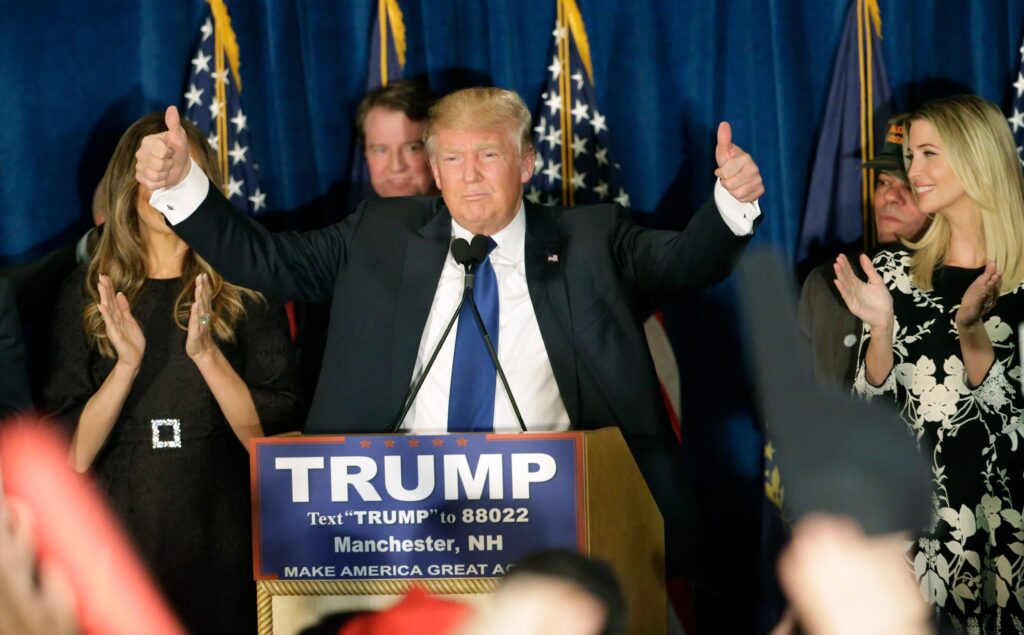- In an unexpectedly early ruling, SCOTUS decided that states can’t remove Trump from the 2024 ballot.
- The decision is a massive victory for Trump, whose eligibility on Colorado’s ballot was challenged.
- The decision was issued one day ahead of Super Tuesday when 16 states will hold primary elections.
The Supreme Court ruled unanimously on Monday that states can’t ban Donald Trump from 2024 ballots, quashing legal challenges that loomed over the GOP frontrunner’s candidacy for office.
The ruling is a massive victory for Trump, who had been disqualified from appearing on the ballot in Colorado, Illinois, and Maine — though the states’ decisions had been stayed pending appeal. The former president was also facing legal challenges to his eligibility to run for office in California, New York, and Wisconsin, which the SCOTUS decision renders irrelevant.
The decision came one day ahead of Super Tuesday, when 16 states will hold primary elections. Lawmakers across the political spectrum had been pushing for the court to issue a decision ahead of the primaries.
“This case raises the question whether the States, in addition to Congress, may also enforce Section 3. We conclude that States may disqualify persons holding or attempting to hold state office. But States have no power under the Constitution to enforce Section 3 with respect to federal offices, especially the Presidency,” the court wrote in an unsigned per curiam opinion.
Trump quickly declared victory.
"BIG WIN FOR AMERICA!!!" the former president wrote on his social media platform, Truth.
The headline of the justices' unanimous decision papers over some major differences on the court, especially over the sweeping scope of the ruling that "only way to disqualify any candidate for federal office is through a statute enacted by Congress," as Steve Vladeck, University of Texas at Austin law professor, put it.
The three liberal justices, Justices Sonia Sotomayor, Elena Kagan, and Ketanji Brown Jackson, cited Chief Justice John Robert's frustration with the court's previous decision to overturn Roe v. Wade.
In particular, the three justices concluded the only thing the court needed to do was Colorado did not have the power to throw Trump over the ballot. Instead, the court effectively foreclosed almost any challenge to a federal office holder under Section 3 of the 14th Amendment, the insurrection clause.
"Today, the majority goes beyond the necessities of this case to limit how Section 3 can bar an oathbreaking insurrectionist from becoming President," the justices wrote. "Although we agree that Colorado cannot enforce Section 3, we protest the majority's effort to use this case to define the limits of federal enforcement of that provision. Because we would decide only the issue before us, we concur only in the judgment."
Justice Amy Coney Barrett, one of Trump's three appointees, also agreed the the entire court went too far in its ruling.
"This suit was brought by Colorado voters under state law in state court," Barrett wrote. "It does not require us to address the complicated question whether federal legislation is the exclusive vehicle through which Section 3 can be enforced."
Barrett did appear to reference the tone of the liberals' concurring opinion.
"The majority's choice of a different path leaves the remaining Justices with a choice of how to respond," she wrote. "In my judgment, this is not the time to amplify disagreement with stridency."
Justices heard oral arguments about the case on February 8 and were not expected to issue a decision until they returned to the bench on March 15.
The SCOTUS decision overturns a December ruling from Colorado's Supreme Court, which disqualified Trump from appearing on the state's ballot and from holding office due to his role in encouraging protesters during the January 6, 2021, Capitol riot.
In its decision, the Colorado Court cited Section 3 of the 14th Amendment, which includes a clause indicating anyone who has "engaged in insurrection or rebellion" or has "given aid or comfort" to those carrying out an insurrection is ineligible to run for office.
The Supreme Court had never before issued a ruling on the post-Civil War era provision known as the "insurrectionist clause."
Though the conservative-majority SCOTUS found he is eligible to run for office, the four charges brought against Trump by the Department of Justice over his conduct on January 6 continue to play out in court.
The Supreme Court is set to hear separate arguments in April over whether Trump can be criminally prosecuted for election interference charges, including those stemming from his role during the January 6 attack on the Capitol.
